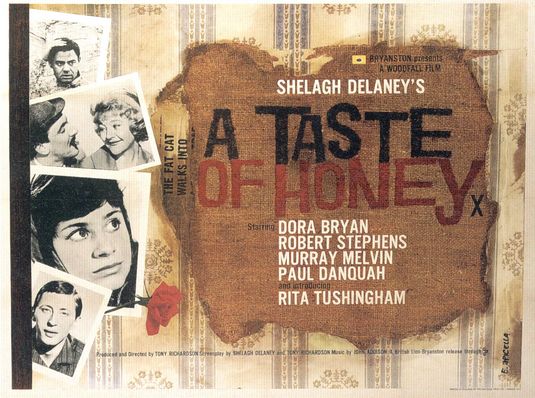In honor of Shelagh Delaney, the playwright who passed away last week, this week’s selection is the film adaptation of her most popular work, A Taste of Honey – a play she wrote at the age of 18.
The movie took a look at an England that stood on the precipice of social and sexual change. It was directed by Tony Richardson and starred Rita Tushingham in her feature film debut. She would later star in other films such as The Girl With Green Eyes. This film is also one of a spate of British films made during this time that focused on the world of England’s working classes in a realistic, straightforward way.
While A Taste of Honey may not be considered overlooked in its home territory, it may not have the same recognition to American audiences, especially those of my age. In very much the same way that The White Bus (also based on a Delaney work) looked the England post-WWII, post-industrial, working class life (but from a surrealistic perspective), A Taste of Honey has a gloomy, bleak environment. A Taste of Honey is a bit more personal and grounded in its look at the life of teenager Jo (Tushingham) – a life that is seemingly as glum as her surroundings. Her unstable life is primarily dominated by her absent mother, who is often absent because she is off with her man of the moment.
Jo eventually befriends and ultimately has a brief interlude with a black sailor, which results in an unplanned pregnancy. She also strikes out on her own and shares a flat with a gay design student.
Despite this murky, setting and themes, I felt this was quite an entertaining film, mainly on the strength of Ruth Tushingham’s performance.
* Be sure to visit Todd’s blog, Sweet Freedom for more overlooked selections residing out in the blogosphere.


A film well worth celebrating, thanks. Its original UK premierre was 50 years ago and as part of the celebrations there was a screening in London at the British Film Institute a few weeks ago which was attended by Rita Tushingham, Murray Melvin and cinematographer Walter Lassally. I was fortunate enough to get a tiket and the film was as sad and magical as ever, as were the two leads who were in really fine fettle.
Thanks for your comment Sergio. That must have been something to watch with the actors there 🙂 Very lucky indeed. I feel like I am just at the tip of the iceberg when it comes to British cinema during this period. My further studies have shown me that this is all part of a film movement which sought to portray the working classes (primarily those in north of England) in a realistic non-stereotypical manner.
I did this one (and Green Eyes0 a few weeks ago. Guess we’re on the same wave length. Love Rita in any movie.
Hi Patti, I linked to your article from my piece 🙂 I was debating as to whether or not I should repeat another film so shortly after you had, but I decided to go ahead as a dedication to Shelagh Delaney.
Really cool blog, i’m glad I stumbled across it over at LAMB! This obviously is an overlooked film, because i’ve never heard of it. Sounds good though!
Cheers Matt. And welcome to iluvcinema!
Many of the films of the Free Cinema movement still hold up very well but the 50s and 60s were also such a great period of expansion and accomplishment in British cinema – many of my favourite films were made then. There are some very good books on the subject like Robert Murphy’s BRITISH SIXTIES CINEMA and John Hill’s SEX, CLASS & REALISM: BRITISH CINEMA 1956-1963 are well worth getting if you don’t already have them. The BFI published a useful guide to resources for films on the period which you can download as a PDF from: http://www.bfi.org.uk/filmtvinfo/publications/16+/pdf/british60s.pdf
Thanks Sergio. I will definitely take a look at some of these titles; the BFI does an excellent job with their texts.
Hi, iluv and company:
Excellent selection and critique!
I remember watching this film when in bed with the flu. A topic that may have shocked when first released. Superbly executed. Along with The Loneliness of the Long Distance Runner . One of the handful of films that lays bare the despair of England after WWII and before the 1960s.
Thanks Jack. I have a couple other films from this period in my DVR queue waiting to be watched 🙂
Fine look at this one, iluv. This was one of the “Kitchen Sink Realism” British films that I managed to catch growing up in the 60s on late night television. It was a wonderful period, no less so for its social realism. Great that you’ve examined this film in an excellent series. Thanks.
Thank you for the comment le0pard! This is a movement that I knew little about until recently for two reasons: 1) I am American and 2) it is a little before my time.
I look forward to watching more of these films 🙂